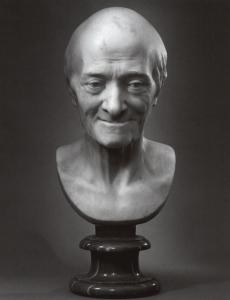 Voltaire once wrote that if God did not exist, we would have to invent him. In truth, we invent God all the time, often with seeming disregard as to whether the God we have invented actually exists or not. Anne Lamott suggests that we can be pretty sure that we have created God in our own image if it turns out that God likes all the people and things that we like and dislikes all the people and things that we dislike.
Voltaire once wrote that if God did not exist, we would have to invent him. In truth, we invent God all the time, often with seeming disregard as to whether the God we have invented actually exists or not. Anne Lamott suggests that we can be pretty sure that we have created God in our own image if it turns out that God likes all the people and things that we like and dislikes all the people and things that we dislike.
She said in one of her Ted talks that a good name for God is “Not Me.” So how am I, or how is any God-believer, supposed to tell whether the God I believe in exists in reality, or exists simply as a figment of my self-obsessed imagination? I regularly have the opportunity to explore these issues with first-semester freshman students; the process is always both dynamic and illuminating.
The texts for an early seminar were the first twenty-five chapters of Genesis and the first twenty-four chapters of Exodus. It is often a challenge to get freshmen to discuss anything in seminar in the early weeks of their first semester; getting a bunch of eighteen-year-olds, most of whom are products of twelve years of Catholic parochial education, to talk about the Bible is even more difficult. But I’ve been doing this for a while and have a lot of tricks. After assuring them that no one has ever been struck dead in any of my classes for speaking honestly about their reactions to what they’ve read in a “sacred text,” a few brave souls began to admit that the God of these Old Testament stories is quite different from the God they had been taught to believe in. This God frequently seems insecure, petty, unfair, and arbitrary—what’s up with that??
In response, I decided to stir up trouble with a thought experiment. I said “Okay, if you don’t like the God of Genesis and Exodus, let’s work for a while on what we do want God to be and to act like. Let’s create a ‘Designer God’—you get to create God from scratch. Write in your notebooks for ten minutes on the following topic: Any God worth believing in will have the following characteristics. Come up with at least three characteristics and explain why any God worth believing in would have to have them. Go.”
After the writing portion of the thought experiment, the students compared notes and found that the God they had just designed individually was pretty similar from person to person. As they offered their favored divine characteristics, I wrote the list on the board:
Any God worth believing in will have the following characteristics:
Forgiving
Trustworthy
Understanding
Fair/Just
Loving (at least to those who deserve to be loved)
Powerful
Dependable
All-Knowing
Not a micromanager
As we discussed selected characteristics on the list, a number of issues were revealed.
Fairness and justice: The biggest problem the students had with the Old Testament God is that He/She/Tney plays favorites. Any God worth believing in should treat everyone the same. “Why?” I asked. Do all of you treat everyone the same? Do you like the eight billion plus people in the world the same? Do you even like the few dozen people whom you know really well the same? They had to admit that they didn’t. “Then why do you expect God to do something that you make no attempt to do?” I wondered. The students struggled for an answer other than that God is God and we’re not, as Annie Dillard suggested—the divine should be held to a higher standard than we are, although where that standard would come from other than God they weren’t sure.
Love and forgiveness: At first, the idea was that any God worth believing in should be loving. Period. “Even mass murderers, drug dealers and child abusers?” I asked. “Well,” several replied, “we need to qualify this love thing a bit.” God should love those who deserve it, or those who believe in God, but not everyone indiscriminately. Love that is equally spread everywhere without qualification is cheapened somehow. God’s love is transactional, in other words. I do this, God responds with love.
Power: Omnipotence turned out to be a big one—no God worth believing in is wimpy or weak. “But God in Genesis and Exodus is powerful and has no problem exhibiting that power on a regular basis. And you didn’t like that,” I reminded them. As it turned out, Designer God should be powerful but should not be all about using that power all the time. “When is it appropriate for God to use that divine power?” “Whenever I or my group is in trouble or needs something” was the most common response. So you want God to be like a 9-1-1 operator or a lifeline on “Who Wants to be a Millionaire?” That didn’t sound right, but maybe so. That led to another Designer God must-have trait.
Dependability: God needs to “be there” was the way that many students put it. “Dependable” and “trustworthy” were synonyms in this discussion. “Being there” means on call, though—the students clearly were not interested in a proactive God that demanded much of them. When things are going badly, listen up and answer my prayers. When things are going well, leave me the hell alone.  The students were largely in agreement when I reframed this trait as a requirement that God not be a micro-manager. An overall plan for my life is fine, but I want to have a great deal of choice in terms of how I choose to find out about and pursue that plan (even freedom not to follow that plan if I so choose).
The students were largely in agreement when I reframed this trait as a requirement that God not be a micro-manager. An overall plan for my life is fine, but I want to have a great deal of choice in terms of how I choose to find out about and pursue that plan (even freedom not to follow that plan if I so choose).
As we entered the last half hour of seminar, I asked everyone to take a mental step back and look at the list of Designer God characteristics that we had been discussing. Truth be told, they looked like the characteristics of a combination of a non-interfering Santa Claus and my students’ parents on a good day. Or the personality traits of the pleasant, vanilla God they had been taught to believe in. The question to ask, I suggested “What evidence is there that the God you have just designed actually exists?” Is there any evidence that these are the character traits of the divine, or are these simply a projection of what we want to believe in?
A careful and clear consideration of the world we actually live in reveals that for every piece of evidence supporting the existence of the Designer God, an equally obvious piece of evidence suggests either the Designer God’s non-existence, or—perhaps more challenging—that whatever God is, God is something quite mysterious, exhibiting characteristics not on our list, and well outside our comfort zones. The Designer God Project was a two-hour exercise in creating God in our own image.

And maybe that’s where most of us would like to stay. We are like the Israelites in Exodus who get the shit scared out of them when God actually communicates with them directly. They are very uncomfortable with the noise, the lightening, the fire, and the obvious power. Their response? “Moses, you go talk to God and tell us what God wants. We can deal with you, but don’t want to deal with that.”
The writer of Hebrews suggests that it is a terrifying thing to fall into the hands of a living God. Something created in my own image is far more comfortable, predictable, and manageable. The uncomfortable thing about adventuring with a real God rather than hanging out with a projection of myself is that it opens the door to continual growth and surprise and blows the doors off my comfort zone. Walking with God is like Forrest Gump’s box of chocolates. You never know what you’re going to get.

















